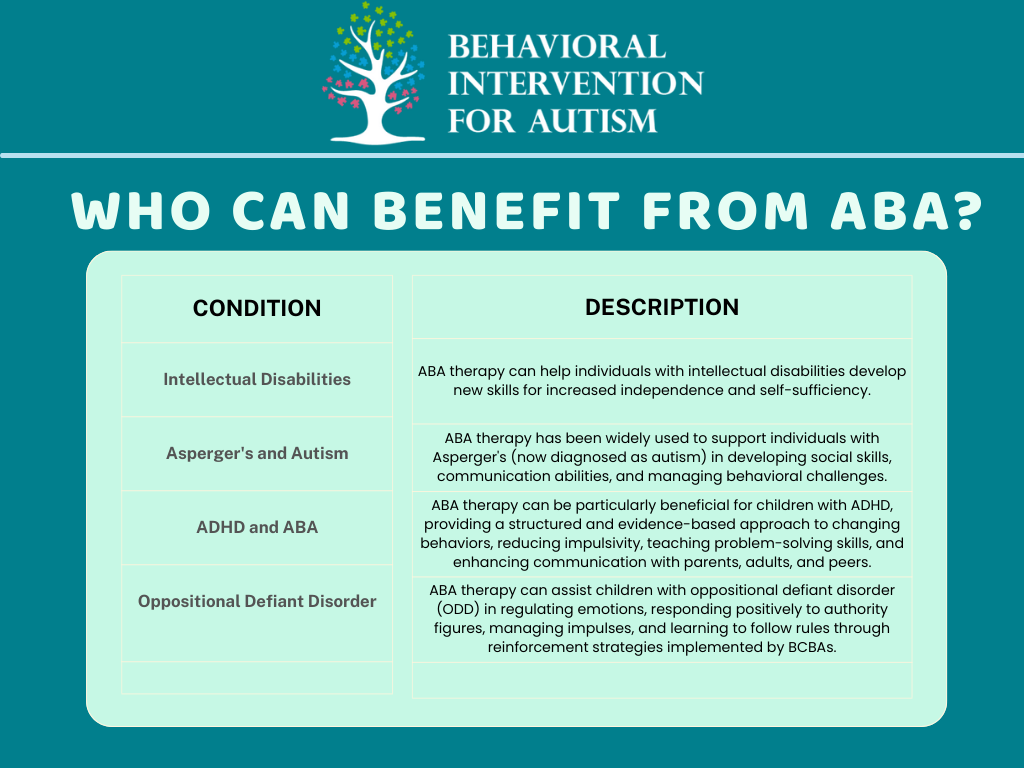
Table of Contents
ABA therapy, short for Applied Behavior Analysis therapy, is a widely recognized and evidence-based approach to treating developmental delays, behavioral challenges, and autism spectrum disorders. This section will provide an overview of the basics of ABA therapy and highlight who can benefit from this type of intervention. Additionally, ABA therapy at home can offer valuable support and reinforcement for individuals undergoing treatment, promoting consistency and progress in familiar environments.
Basics of ABA Therapy
ABA therapy focuses on the principles of behavior analysis to bring about positive behavioral changes and improve an individual’s quality of life. It is a structured and individualized therapy approach that aims to teach new skills, increase independence, and reduce problematic behaviors.
The therapy involves breaking down complex skills into smaller, manageable steps, which are then taught systematically through repeated practice and positive reinforcement. ABA therapists, who are often Board Certified Behavior Analysts (BCBAs), carefully observe and analyze behavior patterns to design interventions tailored to the unique needs and goals of each individual.
ABA therapy is based on the understanding that behavior is influenced by environmental factors, and by modifying those factors, individuals can learn new behaviors and replace undesirable ones. The strategies used in ABA therapy can be applied in various settings, such as home, school, and community, to promote generalization of skills.
Who Can Benefit from ABA?
ABA therapy has shown to be beneficial for individuals with a wide range of developmental delays and behavioral challenges. Here are some conditions and individuals who can benefit from ABA therapy:
It’s important to note that ABA therapy is not limited to diagnosed disabilities. Parents and caregivers can also use ABA strategies to help children develop new skills like self-regulation, communication, emotional management, and understanding social cues.
When considering ABA therapy, it is recommended to consult with qualified professionals and experts in the field to assess the individual’s needs and determine the most appropriate course of intervention. ABA therapy has demonstrated significant effectiveness in supporting individuals with developmental delays and behavioral challenges, and its evidence-based approach continues to make it a valuable treatment option for many.
ABA for Developmental Delays
ABA therapy, also known as Applied Behavior Analysis therapy, is a highly effective approach for individuals with various developmental delays. This therapy focuses on helping individuals develop new skills for increased independence and self-sufficiency. Let’s explore how ABA therapy can benefit individuals with intellectual disabilities, Asperger’s (now diagnosed as autism), and ADHD.
Intellectual Disabilities
ABA therapy can be instrumental in supporting individuals with intellectual disabilities. It aims to enhance their overall quality of life by focusing on teaching skills that promote independence and functional abilities. The therapy utilizes evidence-based strategies to address specific challenges related to communication, daily living skills, social interactions, and problem-solving. By employing techniques such as Discrete Trial Training, ABA therapists help individuals with intellectual disabilities acquire essential skills and improve their overall functioning.
Asperger’s and Autism
ABA therapy has proven to be particularly beneficial for individuals with Asperger’s, which is now included within the autism spectrum. It helps address the core symptoms of autism, such as difficulties with social interactions, communication, and repetitive behaviors. ABA therapists work with individuals to develop social skills, promote emotional regulation, improve communication abilities, and reduce challenging behaviors. By implementing structured teaching methods and behavior management techniques, ABA therapy assists individuals with Asperger’s in navigating social situations and promoting their overall well-being.
ADHD and ABA
ABA therapy can also be advantageous for individuals withAttention-Deficit/ Hyperactivity Disorder (ADHD). The structured and evidence-based approach of ABA therapy provides strategies for changing behaviors, reducing impulsivity, improving problem-solving skills, and enhancing communication with parents, adults, and peers. ABA therapists work closely with individuals with ADHD to establish routines, develop self-regulation techniques, and strengthen executive functioning skills. By focusing on these areas, ABA therapy helps individuals with ADHD improve their overall functioning and achieve success in various aspects of their lives.
ABA therapy offers a comprehensive and individualized approach to address the unique needs of individuals with developmental delays. Whether it’s intellectual disabilities, Asperger’s (autism), or ADHD, ABA therapy provides evidence-based strategies and interventions to support individuals in achieving their full potential and leading fulfilling lives.
ABA for Behavioral Challenges
ABA therapy, or Applied Behavior Analysis therapy, is a comprehensive approach that can be beneficial for individuals facing various behavioral challenges. This therapy is known for its evidence-based strategies that help individuals learn new skills and replace problematic behaviors with more appropriate ones. In this section, we will explore how ABA therapy can address specific behavioral challenges such as oppositional defiant disorder, impulse control, and rule following.
Oppositional Defiant Disorder
ABA therapy can be effective in helping children with oppositional defiant disorder (ODD) manage their challenging behaviors. ODD is characterized by a pattern of defiant, disobedient, and hostile behavior towards authority figures. ABA therapy focuses on teaching individuals strategies to regulate their emotions, respond positively to authority figures, manage impulses, and learn to follow rules.
Through the use of reinforcement strategies implemented by Board Certified Behavior Analysts (BCBAs), ABA therapy helps individuals with ODD develop new skills and replace disruptive behaviors with more appropriate ones. By providing consistent and positive reinforcement for desired behaviors, individuals can learn to navigate social interactions and respond effectively to authority figures.
Impulse Control
Impulse control is a common challenge faced by individuals with various behavioral issues. ABA therapy provides strategies to help individuals develop impulse control skills. Through the use of behavior modification techniques, individuals learn to recognize impulses and implement strategies to delay or redirect their behavior in more appropriate ways.
By using positive reinforcement and teaching alternative coping mechanisms, ABA therapy helps individuals develop self-control and make better choices in challenging situations. The therapy focuses on breaking down complex behaviors into smaller, manageable steps, allowing individuals to learn and practice impulse control gradually.
Rule Following
ABA therapy can also be effective in teaching individuals how to follow rules. For individuals who struggle with rule following, ABA therapy breaks down the process into smaller, achievable steps. It focuses on teaching individuals the importance of rules and the consequences associated with following or disobeying them.
Through consistent reinforcement and positive feedback, individuals learn to understand and comply with rules in various contexts. ABA therapy provides structured and predictable environments where individuals can practice rule following and receive immediate reinforcement for their appropriate behavior.
ABA therapy strategies are not limited to specific diagnoses or disabilities. Parents and caregivers can also utilize these strategies to help children develop new skills, such as self-regulation, communication, emotional management, and understanding social cues. By integrating ABA strategies into everyday routines, parents can create supportive environments that promote positive behavior and skill development.
In summary, ABA therapy is a valuable resource for addressing behavioral challenges in individuals with oppositional defiant disorder, impulse control issues, and difficulties with rule following. By implementing evidence-based strategies, ABA therapy empowers individuals to learn and practice new behaviors, leading to improved functioning and overall quality of life.
ABA for Autism Spectrum
When it comes to autism spectrum disorders, ABA therapy has gained significant recognition for its effectiveness in helping individuals with autism acquire skills, improve behaviors, and enhance their overall quality of life. This section will explore the scientific evidence supporting ABA therapy, as well as its impact on skills development and social interaction.
Scientific Evidence
ABA therapy stands out among other interventions and treatments for autism spectrum disorders due to its extensive scientific evidence supporting its effectiveness. Numerous studies have demonstrated the positive outcomes achieved through ABA therapy, making it one of the most well-researched and evidence-based interventions available.
Research consistently shows that ABA therapy can lead to significant improvements in areas such as communication, adaptive skills, social interaction, and behavioral challenges. The systematic and individualized approach of ABA therapy allows for tailored interventions that address the specific needs and goals of each individual with autism.
Skills Development
One of the primary benefits of ABA therapy for individuals on the autism spectrum is its ability to facilitate skills development. ABA focuses on breaking down complex skills into smaller, achievable steps, allowing individuals to learn and master each step before moving on to the next. This progressive approach promotes skill acquisition and helps individuals gain independence in various areas of their lives.
ABA therapy can help individuals with autism develop a wide range of skills, including language and communication skills, academic skills, self-help skills, and motor skills. By targeting specific goals and providing consistent reinforcement and support, ABA therapy empowers individuals to reach their full potential and improve their overall functioning.
Social Interaction
Social interaction is often a significant challenge for individuals with autism, but ABA therapy can play a crucial role in addressing this area. ABA utilizes various techniques and strategies to teach individuals with autism the necessary social skills to interact with peers, make friends, and navigate social situations effectively.
Through structured interventions, role-playing, and positive reinforcement, ABA therapists can help individuals with autism develop skills such as turn-taking, initiating conversations, sharing, and understanding nonverbal cues. These social skills are essential for building meaningful relationships and successfully engaging in social interactions, both now and in the future.
By focusing on evidence-based practices, skills development, and social interaction, ABA therapy offers promising results for individuals on the autism spectrum. It provides a comprehensive approach that addresses the unique needs of each individual, helping them acquire essential skills and navigate the challenges associated with autism.
ABA for Parents and Caregivers
Parents and caregivers play a vital role in the success of ABA therapy for individuals with ASD. ABA therapy not only focuses on the development of the individual with autism but also provides support, guidance, and skills to parents and caregivers. In this section, we will explore the various ways ABA therapy can benefit parents and caregivers.
Supporting Parents
ABA therapy can help parents of children with autism be the best parents they can be. Through ABA therapy, parents learn effective strategies to understand and respond to their child’s behaviors. They are provided with valuable insights into the underlying reasons for certain behaviors and are equipped with tools to promote positive behavior change.
By understanding the principles of ABA therapy, parents can create a structured and supportive environment for their child. This may involve implementing visual schedules, using reinforcement techniques, and establishing clear expectations. ABA therapy empowers parents with the knowledge and skills necessary to support their child’s progress and overall well-being.
Enhancing Parenting Skills
ABA therapy provides parents and caregivers with valuable tools and techniques to enhance their parenting skills. It equips them with evidence-based strategies to address challenging behaviors, promote desired behaviors, and foster a positive and nurturing environment.
Through ABA therapy, parents learn how to effectively use reinforcement, implement behavior management techniques, and establish clear and consistent expectations. They are also taught techniques for managing challenging behaviors, such as tantrums or meltdowns, in a calm and supportive manner.
By enhancing their parenting skills through ABA therapy, parents and caregivers can create a harmonious and supportive environment that fosters their child’s growth, development, and overall well-being.
ABA for Independence
ABA therapy is a valuable tool for individuals with autism, helping them develop the skills necessary for independence. Through targeted interventions and evidence-based techniques, ABA therapy can address various areas of daily living and enhance overall functioning. Here, we will explore how ABA therapy can promote independence in three key areas: daily living skills, communication skills, and self-advocacy.
Daily Living Skills
ABA therapy plays a crucial role in teaching individuals with autism the essential daily living skills needed for independence. These skills encompass a wide range of activities, including personal hygiene, dressing, meal preparation, and household chores. By breaking down tasks into smaller and manageable steps, ABA technicians can employ strategies like Discrete Trial Training to effectively teach and reinforce these skills.
Through consistent practice and positive reinforcement, people with autism can gradually acquire and generalize daily living skills. ABA therapy focuses on promoting independence by fostering self-sufficiency and reducing reliance on others for basic tasks. This ultimately empowers individuals to lead more independent and fulfilling lives.
Communication Skills
Communication is fundamental to independence, and ABA therapy can significantly impact the development of communication skills in individuals with autism. Using evidence-based techniques, such as Applied Verbal Behavior (AVB) and Natural Environment Teaching (NET), ABA therapists work on improving expressive and receptive language skills.
ABA therapy addresses various aspects of communication, including vocabulary expansion, sentence structure, social pragmatics, and nonverbal communication. By employing visual supports, social stories, and other interactive strategies, ABA therapists help individuals with autism overcome language barriers and enhance their ability to express their wants, needs, and thoughts effectively.
Self-Advocacy
ABA therapy can prepare individuals with autism to be their own best advocates. By teaching self-advocacy skills, ABA therapists empower individuals to assert their needs, make informed decisions, and actively participate in their own lives. Self-advocacy training includes skills such as problem-solving, decision-making, self-regulation, and self-determination.
Through ABA therapy, individuals with autism learn to identify and communicate their preferences, advocate for their rights, and navigate social situations more independently. These skills not only promote self-confidence and self-esteem but also enable individuals to effectively advocate for themselves in various settings, including educational, vocational, and social environments.
By targeting daily living skills, communication skills, and self-advocacy, ABA therapy equips individuals with autism with the tools they need to lead more independent lives. Through evidence-based techniques and personalized interventions, ABA therapists support individuals in acquiring the necessary skills to navigate daily challenges, communicate effectively, and advocate for themselves. This empowers individuals with autism to achieve greater independence and thrive in various aspects of life.
Sources:
https://www.empowerbh.com/blog/who-benefits-from-aba-therapy/
https://www.ncbi.nlm.nih.gov/pmc/articles/PMC3196209/
https://www.forbes.com/health/mind/what-is-applied-behavior-analysis-aba/
- Signs of an Autistic Child at Age Two - April 11, 2024
- Can Trauma Cause Autism? - April 11, 2024
- Can an Autistic Child Go to Normal School? - April 11, 2024





